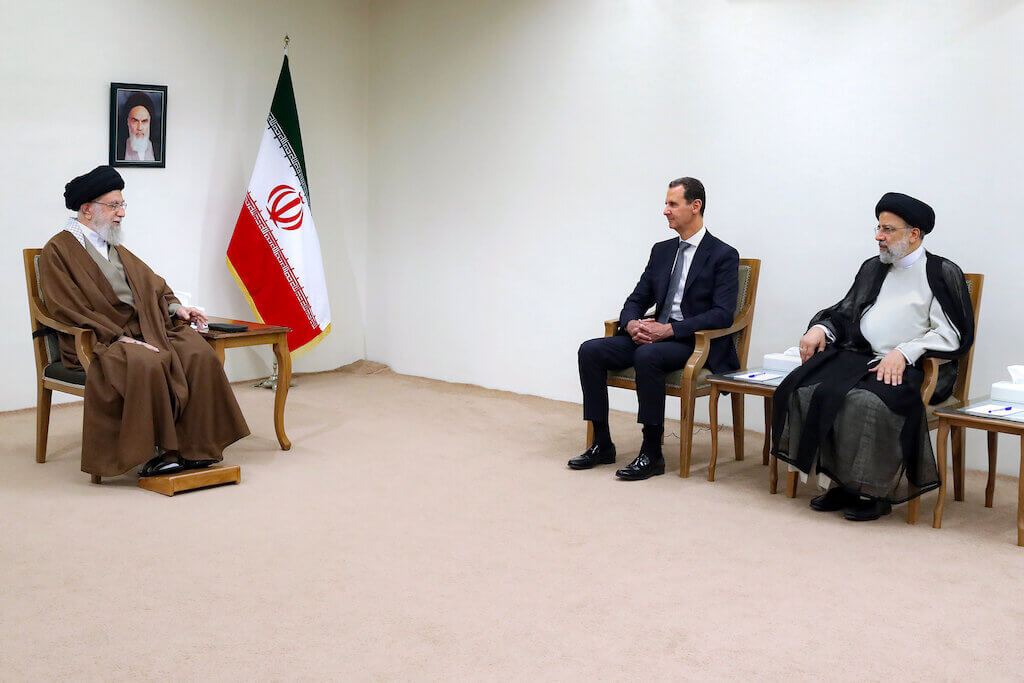Syrian President Bashar Al-Assad vowed to fight Israel and support Palestine during meetings with Iranian Supreme Leader Ayatollah Khamenei and President Ebrahim Raisi in Tehran on Sunday. The visit was Assad’s second trip to Iran since the Syrian civil war erupted in 2011.
Assad noted that Damascus and Tehran must continue to work together to prevent Israel’s expansion in the region. “What stopped the Zionist regime [Israel] from being able to gain control of the region is the strategic relations between Iran and Syria, which must continue with strength,” he told Khamenei.
الرئيس الأسد يجري زيارة عمل إلى العاصمة الإيرانية طهران التقى خلالها آية الله السيد علي الخامنئي قائد الثورة الإسلامية في إيران، وإبراهيم رئيسي رئيس الجمهورية الإسلامية الإيرانية. pic.twitter.com/aMQahfNOXE
— Syrian Presidency (@Presidency_Sy) May 8, 2022
In this respect, Assad said that Iran and Syria should extend greater support to Palestine in order to weaken the efforts of Israel to gain legitimacy. “Experience has shown that the coordination and interaction of countries in the region on various issues, including the Palestinian issue, has been very effective,” he claimed, adding that “the success of the Palestinian resistance has shown that compromise by some Arabs has backfired.”
Furthermore, Assad called Syria’s ties with Iran “strategic” and stated, “Developments in the region after a decade of war against the axis of resistance, have shown that resistance is effective and fruitful,” he said. His ‘axis of resistance’ comment refers to the military alliance formed by Iran, Syria, and Lebanese militia Hezbollah to counter the United States (US), Israel, and Saudi Arabia in the region.
The heads of some neighboring countries meet with the heads of the Zionist regime & have coffee with them. But the people of those same countries fill the streets on #QudsDay to chant anti-Zionist slogans!
— Khamenei.ir (@khamenei_ir) May 8, 2022
This is the reality of the region today.
Khamenei agreed with Assad on countering Israeli influence in the region. “The heads of some neighbouring countries meet with the heads of the Zionist regime and have coffee with them,” he said referring to the Arab countries that normalised ties with Israel. “But the people of those same countries fill the streets on Quds [Jerusalem] day to chant anti-Zionist slogans. This is the reality of the region today,” the supreme leader went on to say.
President Raisi, who also attended the meeting, said that the “threats of the Zionist Regime in the region should be addressed by strengthening and diversifying the deterrence equations.” Accordingly, he emphasised that Iran has “serious will and desire […] to improve the level of cooperation and relations” with Syria in all fields.
لحظات من لقاء رئيس الجمهوريّة العربيّة السوريّة السيّد بشّار الأسد وحواره مع الإمام الخامنئي.
— موقع الإمام الخامنئي (@site_khamenei) May 8, 2022
المصدر: مكتب رئاسة الجمهوريّة العربيّة السوريّة pic.twitter.com/XE7DUKBL1n
“The whole of the Syrian land must be liberated from foreign occupiers. This occupation should not be subject to the passage of time, and the occupying forces and their mercenaries should be expelled,” Raisi added, referring to Israel’s occupation of Syria’s Golan Heights following the 1967 war.
In 2019, the United States (US) under President Donald Trump recognised the Golan Heights as a part of Israel and the Biden administration has said that it does not plan to change that decision.
Israel and Iran have been fighting a deadly proxy war for decades and following the eruption of the 2011 Syrian civil war, the shadow conflict spread to Syria. While Iran has been arming local Syrian militias and transferring arms to Hezbollah, which fought a devastating war against Israel in 2006, Israel has been conducting thousands of airstrikes against Iranian targets.
This is only Assad's second visit to Iran since the war started. His first visit was in Feb 2019, which was rife with drama.
— Kian Sharifi (@KianSharifi) May 8, 2022
Then FM Zarif was frozen out of Assad's meetings with Khamenei & ex-President Rouhani - but Quds Force Commander Soleimani was in both meetings. pic.twitter.com/j7ccjoaWBQ
Syria has condemned the airstrikes, as it views Israel’s actions as a violation of its sovereignty.
Moreover, Assad told Raisi and Khamenei that by working closely it is possible to “defeat the US and the hegemons who claim to be superpowers,” especially since Washington has been gradually withdrawing from the Middle East.
Syrian state-owned news agency SANA quoted Assad as saying that Washington is “weaker than ever” today and that greater cooperation will “not allow the US to rebuild the international terrorist system that is used to harm the countries of the world, especially the countries of the region over the past decades.”
Both Syria and Iran have grievances with the US, which has imposed sanctions on the former for human rights violations and on the latter over its nuclear programme and military activities.

